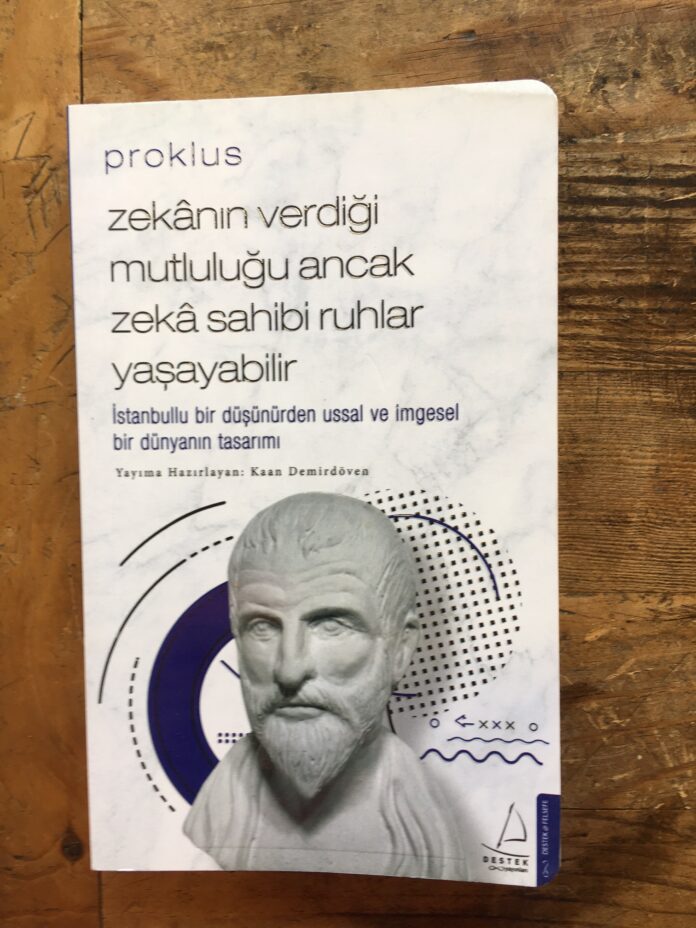Proclus book of “Only Intelligent Souls Can Experience the Bliss of Intelligence” was translated in Turkish language and published in his hometown Istanbul in 2020
Biography
Proclus Lycius (/ˈprɒkləs laɪˈsiəs/; 8 February 412 – 17 April 485), called Proclus the Successor (Greek: Πρόκλος ὁ Διάδοχος, Próklos ho Diádokhos), was a Greek Neoplatonist philosopher, one of the last major classical philosophers. He set forth one of the most elaborate and fully developed systems of Neoplatonism. He stands near the end of the classical development of philosophy and influenced Western medieval philosophy (Greek and Latin).[1]
Proclus was born on February 8, 412 AD (his birth date is deduced from a horoscope cast by a disciple, Marinus) in Constantinople to a family of high social status in Lycia (his father Patricius was a high legal official, very important in the Eastern Roman Empire’s court system) and raised in Xanthus. He studied rhetoric, philosophy and mathematics in Alexandria, with the intent of pursuing a judicial position like his father. Before completing his studies, he returned to Constantinople when his rector, his principal instructor (one Leonas), had business there.
Proclus’s works
- Platonic Theology: A long (six volumes in the Budé edition) systematic work, using evidence from Plato’s dialogues to describe the character of the various divine orders
- Elements of Theology: A systematic work, with 211 propositions and proofs, describing the universe from the first principle, the One, to the descent of souls into bodies
- Elements of Physics
- Commentary on Plato’s “Alcibiades I” (it is disputed whether or not this dialogue was written by Plato, but the Neoplatonists thought it was)
- Commentary on Plato’s “Cratylus”
- Commentary on Plato’s “Parmenides”
- Commentary on Plato’s “Republic”
- Commentary on Plato’s “Timaeus”
- A Commentary on the First Book of Euclid’s “Elements”
- Three small works: Ten doubts concerning providence; On providence and fate; On the existence of evils
- Various Hymns (fragments)
- Commentary on the Chaldaean Oracles (fragments)
- The Life of Proclus, or On Happiness: written by his pupil, Marinus of Samaria
- A number of other minor works or fragments of works survive. A number of major commentaries have been lost.
- The Liber de Causis (Book of Causes) is not a work by Proclus, but a summary of his work the Elements of Theology, likely written by an Arabic interpreter. It was mistakenly thought in the Middle Ages to be a work of Aristotle, but was recognised by Aquinas not to be so.
A list of modern editions and translations of his surviving works is available at:
“Editions and Translations: Proclus (after 1900)”. De Wulf–Mansion Centre for Ancient, Medieval and Renaissance Philosophy.
Proclus – Only Intelligent Souls Can Experience the Bliss of Intelligence
“Everything is in everything.”
Proclus, who was awarded Plato’s cloak in Athens at an early age, represents one of the two branches of Neoplatonism. In the first arm Plotinos appears in mathematics, in the second arm Proclus in logic.
Proclus aimed to intertwine Plato’s transcendent ideas and Aristotle’s substances. This philosopher, who deeply influenced Islamic philosophy, became the head of the Platon Academy and also served as the mayor of Constantinople for a short time.
He even managed to attract the attention of the famous philosopher of the modern age, Hegel, with the system he established by questioning the concepts of existence, mind, causes, spirit, nature of knowledge, time, eternity and many more.
The book you hold in your hands is a versatile monograph of Proclus.





















